Features
![]()
The Minds Behind InfoCamp
By Jack Baur, Pictures by Kris Bell (flickr photostream)
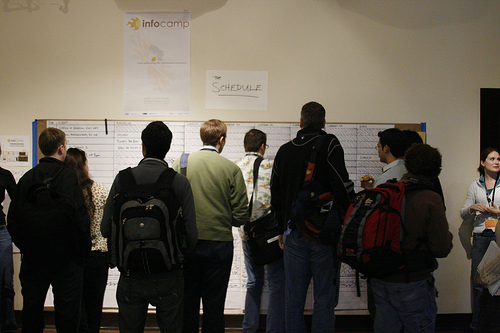
This past October, the American Society for Information Science and Technology (ASIS&T) student and regional chapters hosted an event that, I hope, will set a precedent for future information-related conferences in the area: InfoCamp Seattle 2007. This event followed a “BarCamp” model, characterized by an open, attendant-generated schedule, allowing for discussion of ideas among diverse groups of people (more on that below). I was proud to offer my services as a volunteer for the event and made connections with a lot of cool people, including Canadian library students and the director of what sounds to me like the coolest non-profit ever (which I really hope to intern for once I find some time).
Enough about my experiences though (you can read about the experiences of another iSchooler here). I want to go straight to the source. Over the break, Silverfish talked to the brains behind InfoCamp, the iSchool students and alumni who helped put this thing together, to learn about the inspiration for this fantastic event, the pitfalls of putting together an “un-conference,” and plans for the future. These brave souls are:
Rachel Elkington: MSIM ‘08
Aarom Louie: MLIS ‘03
Corprew Reed: MLIS (Corprew declined to be interviewed for this piece)
Kristen Shuyler: MLIS ‘05
Andy Szydlowski: MLIS ‘08
What was the original idea behind InfoCamp? How did you guys get started?
Rachel: For me, at least, the idea behind InfoCamp started when I went to the Information Architecture Summit in Las Vegas. At one of the social mixers, I talked to Nick Finck (from Seattle) and John Allsop (from Australia). They told me about the whole BarCamp phenomenon. In the course of talking to them, I decided that UW ASIS&T would throw a BarCamp in the coming year. I talked to Andy about it, and he got on board. Then, at the iEdge conference [in March, 2007], Andy and I talked to Aaron who decided that ASIS&T PNW would be interested as well. With our forces combined, we proceeded boldly where no branch of ASIS&T had gone before.
Aaron: As newly appointed officers of ASIS&T PNW, Corprew and I had many ideas for how to revitalize the chapter and strengthen the community of user-centered information professionals in the region. One of our requirements as officers was to hold an annual chapter meeting. Rather than following the tradition of an academic-style conference, but we wanted to create a more participatory annual meeting that would encourage professionals and students to share their ideas, best practices, and collective wisdom with each other. This would strengthen the community by establishing social connections between people from different organizations, sectors, backgrounds, and levels of experience. It would also provide value to students and job seekers looking to network and to recruiters looking for people to hire.
Andy: I think the primary idea was InfoCamp was really interesting and novel: focus on the building of community to help facilitate discussion in the professional communities. We wanted to create an environment that was fun and laidback, where spontaneous and serendipitous knowledge exchanges could occur that would not have happened in any other way. From the student perspective, we wanted to provide our peers a chance to engage the professional community in that laidback atmosphere, but have something more to do than just mill around and eat some food like at most networking events. This was a chance to engage in discussion without having to be obviously identified as a student. I really feel this format levels the playing field in that regard, because it is so egalitarian.
What is a BarCamp?
Aaron: A BarCamp is a type of un-conference where the schedule is not decided on beforehand. No speakers or topics are chosen beforehand. In fact, many BarCamps don't even settle on a theme or topic in advance. They just invite the right people and let the attendees decide what they want to talk about. BarCamps, by design, are participatory and user-centered, encouraging input, discussion, and debate from everyone who shows up. Because no sessions are set before the conference, the participants can talk about the latest developments in their field and the most pressing current issues.
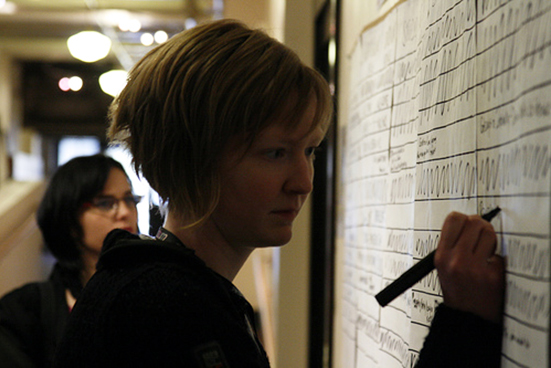
Andy: It can be really exciting, because of the perceived (and hopefully controlled) chaos. This is really appealing to some people, myself included, for its creation of a dynamic and expressive environment. Everybody has the chance to get involved, and there is plenty of opportunity. Every presentation is a gateway to continued conversation. At this point I realize that it is hard to separate myself from the rhetoric I have used in promotional memos and listserv emails, but eh, I actually believe this stuff…
Rachel: It is basically an ad-hoc conference where everyone participates in doing everything so that there is no admission charge and all ideas are allowed to be expressed and exchanged. The BarCamp model is great for information sciences – it is like a wiki instead of an encyclopedia. Everyone can edit it.
There is of course, still room for traditional conference model. And to be completely accurate – InfoCamp is a hybrid, it is not a true BarCamp. A BarCamp in the strictest sense has no preset schedule at all. We decided to make a few modifications to that model by having a key note and a plenary speaker. I think it was the right thing to do with a group that had never done a BarCamp before. Bob Boiko’s talk especially was designed to get people motivated to give more sessions.
Why do you think this model was most appropriate for the Information Science field in general, and the needs of the ASIS&T community specifically?
Kristen: I think that the BarCamp model works well for the field of library & information science because folks in this field are often good at sharing and gathering information -- and curious about finding new and interesting ways to do so.
Aaron: The highly collaborative aspect of the BarCamp -- especially the real-time session creation, ad hoc discussion, and knowledge sharing -- provided professionals and students with an environment very similar to that of the workplace of an information professional. This
format would allow students to interact with practitioners in their natural habitat and to build essential skills in facilitation, public speaking, and collaborative design.
Traditional conferences tend to have prohibitively expensive registration fees. In contrast, BarCamps are usually very low cost, owing to the high level of corporate sponsorship. In order to reach our low-income constituents -- students and librarians -- we wanted to keep any financial barriers as low as possible. We sought out corporate sponsors and professional organizations with a strong interest in information architecture and user-centered design. We were able to bring in sponsors to cover over 80 percent of our costs, so the registration fee was $20 for general admission and free for students and professional organization members.
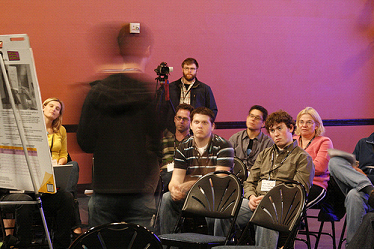
Compared to the traditional academic conference model, the BarCamp format seemed the perfect solution to the challenges our regional chapter and local professional community faced. Dry, academic, reports on 9-month-old research would be replaced by lively discussion about what people were working on last week. Boring panels discussing the impact of last year's technology would give way to round tables on emergent technologies announced yesterday -- or that morning. A book of proceedings filled with abstracts no one ever reads would be replaced by a Flickr photo pool, blog entries, hastily scribbled sticky notes, Facebook and LinkedIn invitations, a stack of business cards, and an interview with a top user-centered design agency.
What were some of the difficulties, challenges, or surprises about organizing this event?
Rachel: To be honest, the event went with fewer hiccups than I had thought. The biggest one for me was that I had be a bridesmaid in wedding in Salt Lake City on the first day of InfoCamp. It broke my heart, but hey, what can you do?
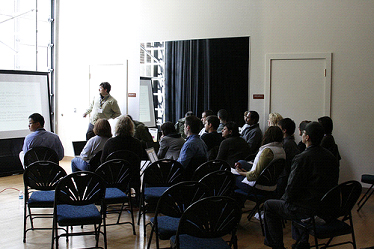
Kristen: The biggest surprise was how smoothly InfoCamp ran. Not knowing what to expect in terms of the actual turnout or the character of the event, I imagined we'd have a lot more last-minute emergencies and changes of plans than we actually did. The volunteers, the team, the participants, and the venue staff worked really well together.
Andy: I think one of my favorite moments was, in the midst of scrambling to get everything in the venue, we realized that on top of all the unpacking and technical and logistical issue before us (with registration desks, internet routers, food, projectors and sound systems), the industrial-size coffee pot was going to take about an hour to brew. And people were already arriving early! Quickly, some of our awesome volunteers found a smaller coffee maker and toiled at brewing individual pots to the increasing threat of an underactive mutiny. Finally, one of the volunteers plunged into the crowd to bring steaming hot, sweet relief person to person. Eager, soon to be contented, hands held out paper cups to be filled with freshly brewed coffee that was being brewed and delivered pot by pot to buy time as the steely monstrosity gurgled away…slowly. Once the masses were satisfactorily caffeinated, I knew we had it made!
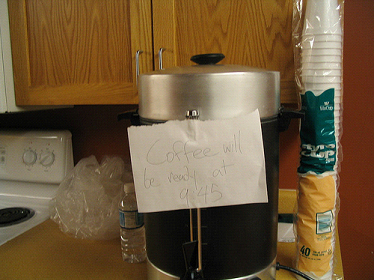
What were your impressions of the event? Who showed up? What did you like about it?
Rachel: The event came together so, so well. That is largely due to the hard work of Aaron, Andy, Corprew, and Kristen who worked harder for longer than is even rational. We all reached our points of being completely emotionally overwhelmed and exhausted in the weeks leading up to InfoCamp, but we pulled it through. The support we got from volunteers was critical, and I can’t say thank you enough to all of those people. Also, the support we got in the form of sponsorship was phenomenal.
Kristen: My favorite part of InfoCamp was meeting a lot of new people (as well as re-connecting with colleagues from the Information School) and learning what they are working on and thinking about lately. Also, it was great to witness the other people at the event meet and make connections across the multidisciplinary field of information science.
About 100 people attended (96 signed in at the registration table). InfoCamp brought together entrepreneurs, professors, information architects, user experience designers, leaders of local non-profits and businesses, government employees, librarians from universities and public libraries, students from all over the Pacific Northwest, and many others!
Aaron: I think all our goals were met and, in many ways, exceeded in this first InfoCamp. We succeeded in cultivating excitement and a sense of community amongst our colleagues. We facilitated a sorely needed meeting of minds between user experience professionals, librarians, and Information School students. And, hopefully, our sponsors were able to find some promising recruits amongst the attendees.
What are your plans for the future of InfoCamp?
Rachel: There will most definitely be an InfoCamp 2.0 – Corprew has already reserved the venue. I expect it will have more people, more sponsorship, more everything.
Andy: I think next time we are going to try and shorten the duration but make it more continuous. Also, play-up the social aspect and maybe have more of a party atmosphere… really, isn’t that the best part of conferences. We already have plans to reconvene after the New Year to work on InfoCamp Seattle 2008!
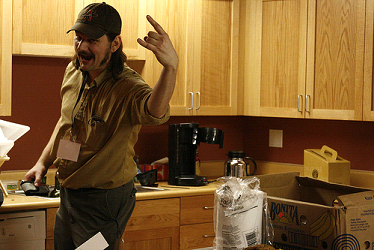
To learn more about InfoCamp Seattle 2007, see the schedule, read about some of the sessions, and contact the leaders about getting involved with InfoCamp 2008, check out their wiki here.
January 11,
2008
Vol. XII Issue 2

iServe’s iKnit program collected: 13 hats, 4 scarves, 4 bags of toiletries/sundries Silverfish’s DAWN House drive collected:
$160 in gift cards, 6 toys, 4 coloring pads, 3 sets of art supplies, 3 board/card games, 3 pots and pans, 1 kitchen set, 2 books, 1 watch, 1 coffee maker, 1 roll of wrapping paper, and an unspecified amount of candy

Top 5
- National socialism and soccer
- Orangeries--Italy
- Anti-estrogenic diet
- Deviant behavior in rabbinical literature
- Milk ducts
Find better ones?
Add them to the blog


